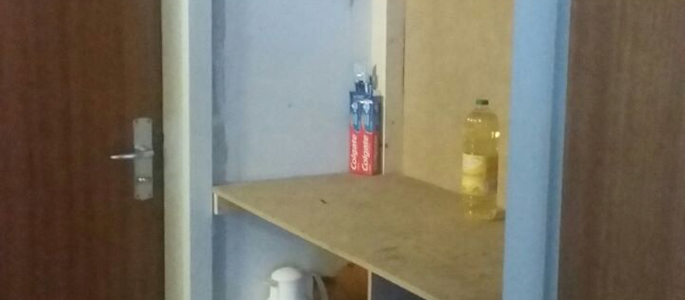Integration benefit violates Danish constitution and human rights
New report from state institution documents that refugees in Denmark do not have their basic needs covered
Facts from the report about receivers of integration benefits:
• Only 2% have Danish background, other 2% have Western background, and 96% have non-western background
• Almost all are refugees: largest groups are from Syria (48%), Eritrea (12%) and stateless (8%)
• 83% have been in Denmark less than 3 years
• Copenhagen houses the largest number (1,752) – where the rent level is high
The report also mentions a number of shocking examples:
A single mother with 4 children live in one room and share kitchen and bath with others in the basement, the children can’t go there alone, and all 4 children must follow their mother when she goes to the kitchen. Several families live in temporary housing with mold and windows where cold air is leaking in. A family of 6 live in a one-room apartment. A child sleeps in a kitchen on a folding bed. Single persons share rooms as elle as kitchen and bathrooms – one example in a close down hospital. An employee in a municipality tells about a mother of 7 where they were all actually starving for days as they ran out of money.
Get the report here (with English summary on page 8)
Danish Institute for Human Rights (IMR) has recently published a report of 112 pages about the effect of the so-called integration benefit, which was introduced in September 2015. Today, 50,000 people in Denmark are living off this very low allowance, and around 20,000 of them are children.
IMR interviewed 22 refugees, primarily families, + 8 integration workers, in two municipalities. Refugees Welcome helped IMR to get in contact with some of them. We have also described the situation for both singles and families in an article from January 2017: “Can you survive on integration benefit?”
The purpose of the report is to examine whether the low allowance is a violation of the Danish Constitution section 75 2) which says the state should secure a substance minimum for all citizens, and the protection against discrimination which is a basic human right. The conclusion is, that both are probably violated. However, the wording of the report is careful, as there is no practice from The European Court of Human Rights on similar legislation.
The living standard for a number of families is below a minimum level, and therefore in violation of the Danish Constitution. Some families cannot afford basic things as three daily meals, medicin, glasses, winter clothing, transport, and all of them are living below the level of relative poverty as defined by Statistics Denmark.
The discrimination is not direct, as Danes can also receive the low benefit – but in practice 93% of the people on integration benefit are not Danish citizens, which makes it indirect discrimination. The purpose of the low allowance is partly to bring down the number of asylum seekers, partly to make more people find a job. However, there are no analyses to prove whether it actually has an effect on these two things.
Minister for integration Inger Støjberg rejects the criticism, quoted in the Danish news paper Information:
»I don’t think the integration benefit is too low. On the contrary. If I were to adjust the level, it would be to lower it further.«
The benefit has already been reduced by 3%, and from next year it will also be harder to move from integration benefit to normal unemployment benefit (kontanthjælp), as the time spent in Denmark required will be raised to 9 out of the last 10 years, and a requirement for employment will be added.
IMR recommends that the government secures a subsistence income support for families with young children, introduces a right to support for medicine expenses and secures access to cheap, permanent housing.
The amount available for each person varies a great deal, depending on the family construction, time spent in Denmark and form of housing: from a minus of 9,762 DKR per month to plus of 423 DKR per month. Especially newly arrived with more than one child have very little to live from because of the principle of gradually earning the full amount of child support over 6 years.
A newly arrived family with 6 children get exactly the same amount per month as a couple with one child (17,306 DKR before tax). The monthly deficit for a single parent with 4 children after 6 months in Denmark will be 9,762 DKR when calculating the minimum budget from Rockwool Foundation, and 11,765 DKR below the limit of relative poverty set by Statistics Denmark. The principle of gradually earning the child support and the loft above allowances affecting the housing support are crucial factors here.
The interviewed families all describe a number of deprivations in their everyday life: There is no money for winter clothing, bicycles or computer for the children, few of the children can attend sports or leisure activities. Weekend school trips, birthday parties, play groups, ‘klassekasse’ etc. are all a big problem.
The poverty leads to social isolation and lesser integration: You have to stay at home, trips or visits or sports are not possible. Especially transportation is a problem. Mothers groups, network families, parties and friends must be refused when there is no money to buy a cake, some fruit, a present. Older children take jobs to help the family economy, which can affect their school work.
And one thing is not even mentioned in the report: From this economical situation a mother or father is expected to save up money for flight tickets and visa fees if or when a permission for family reunification is granted. An amount which can easily exceed 30,000 DKR for a family with many children. Thus, an actual hindrance is laid out for reuniting refugee families.


